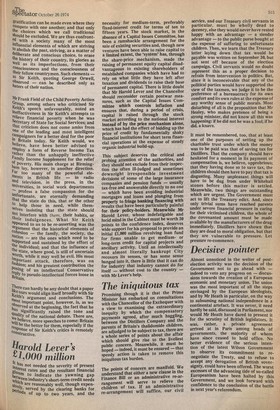The iniquitous tax
Promising though it is that the Prime Minister has embarked on consultations with the Chancellor of the Exchequer with a view to examining the extraordinary inequity by which the compensatory payments agreed, after much haggling, between the Distillers Company and the parents of Britain's thalidomide children, are adjudged to be subject to tax, there are a whole series of points about the affair which should give rise to the liveliest public concern. Meanwhile, it must be hoped — indeed, it must be ensured — that speedy action is taken to remove this iniquitous tax burden.
The points of concern are manifold. We understand that either a new clause in the Finance Bill or an administrative re-arrangement will serve to relieve the children of tax. If an administrative re-arrangement will suffice, our civil service, and our Treasury civil servants in particular, must be wholly dead to decency, else they would never have rested happy with an advantage — a slender advantage — to the public purse bought at the expense of suffering to unfortunate children. Then, we learn that the Treasury letter laying down that tax would be payable was written on September 30, but not sent off because of the election campaign. Civil servants would no doubt represent this as a proper decision to refrain from intervention in politics. But, since it is inconceivable that any of the political parties would have supported the view of the taxmen, we judge it to be the preference of a bureaucracy for its own comfort and its own rules at the expense of any worthy sense of public morals. Most disturbing of all is the proposition that Mr Healey, who makes pretence of being a strong minister, did not know all this was happening: if he did not he was a fool; if he did, a knave.
It must be remembered, too, that at least one of the purposes of setting up the charitable trust under which the money was to be paid was that of saving tax for Distillers. That the company should have hesitated for a moment in its payment of compensation is, we believe, opprobrious; that they having done so to save tax, the children should then have to pay that tax is disgusting. Many unpleasant things will have to be dug from under Whitehall stones before this matter is settled. Meanwhile, two things are outstanding which are urgent. The Government must act to lift the Treasury edict. And, since only trivial sums have reached parents under severe financial pressure in caring for their victimised children, the whole of the covenanted amount must be made available by the manufacturers of the drug immediately. Distillers have shown that they are dead to moral obligation, but that they are vulnerable to pressure. Let pressure re-commence.










































 Previous page
Previous page